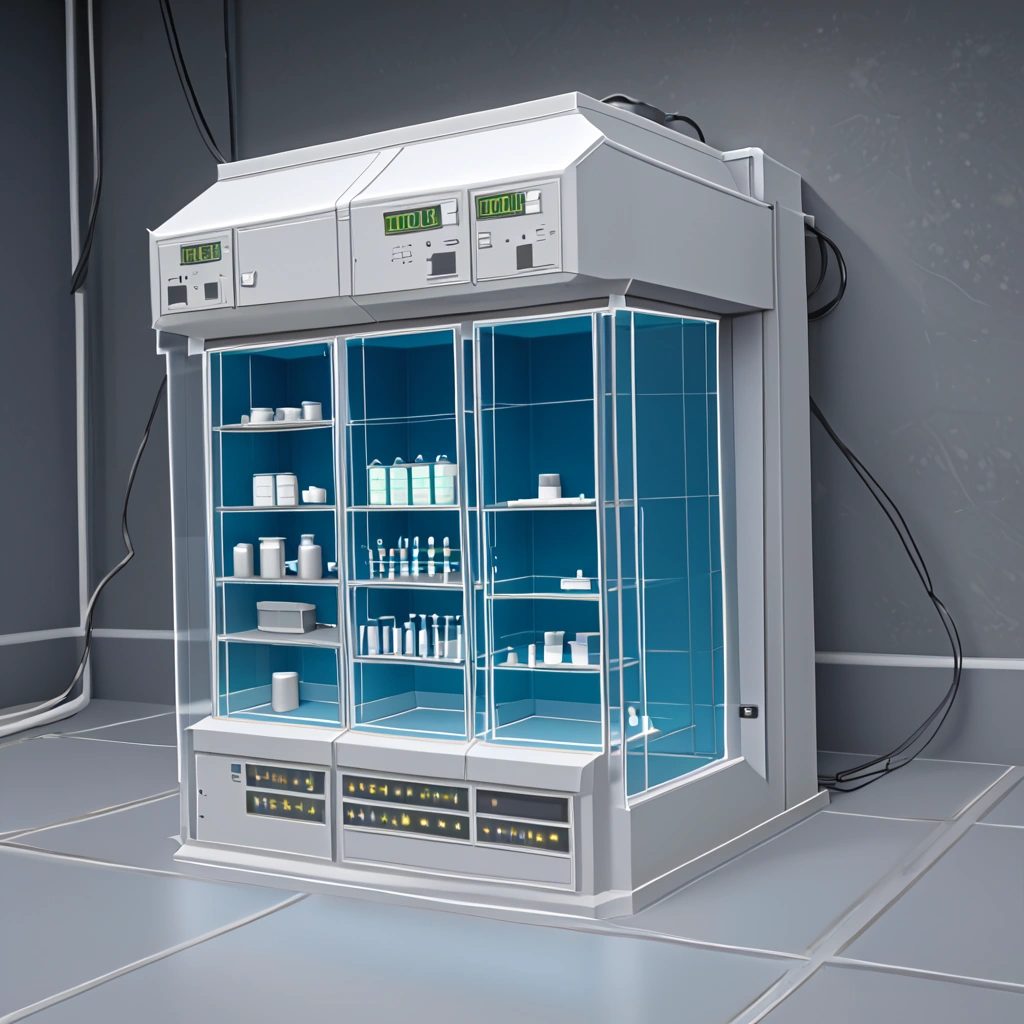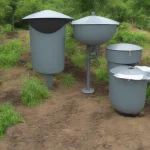Sustainable Off-Grid Waste Management: Innovative Recycling Technologies for Eco-Friendly Living
The Off-Grid Waste Challenge: A Call for Innovation
The allure of off-grid living, a siren song for those seeking self-sufficiency and a reduced environmental footprint, often clashes with the stark reality of waste disposal. In remote locations, traditional municipal waste services are absent, forcing residents to confront the challenge of managing their refuse sustainably. Piles of garbage are not only unsightly, but also pose significant health and environmental risks, contaminating soil and water sources. The absence of regular waste collection necessitates a proactive approach, compelling off-grid dwellers to become intimately involved in the entire lifecycle of their waste.
This challenge, however, presents a unique opportunity to embrace innovative solutions and redefine our relationship with waste. The global waste management market is projected to reach $530 billion by 2025, highlighting the increasing importance of effective and sustainable waste solutions, especially in areas lacking traditional infrastructure. This article delves into the world of sustainable off-grid waste management, exploring innovative off-grid recycling technologies that empower individuals and communities to live in harmony with nature, transforming waste from a problem into a valuable resource.
It’s about more than just waste reduction; it’s about closing the loop, creating a circular economy within the confines of a remote homestead. Embracing off-grid recycling and waste reduction strategies is paramount for minimizing environmental impact and fostering true eco-friendly living. By implementing systems like composting toilets and exploring techniques like vermicomposting, off-grid communities can significantly decrease their reliance on external resources and build resilience. Effective off-grid waste management hinges on understanding the principles of resource recovery.
This involves viewing waste streams not as liabilities, but as potential assets. Food scraps, for instance, can be transformed into nutrient-rich compost through vermicomposting or traditional composting methods, enriching the soil for gardening and reducing the need for synthetic fertilizers. Similarly, anaerobic digestion can convert organic waste into biogas, a renewable energy source for cooking and heating. Even seemingly inert materials like plastics and glass can be repurposed through creative upcycling projects, extending their lifespan and minimizing their environmental footprint.
The key lies in adopting a holistic approach that considers the entire waste stream and seeks to maximize resource utilization. Moreover, the adoption of sustainable technologies plays a crucial role in effective remote waste disposal. Composting toilets, for example, offer a water-saving alternative to conventional flush toilets, reducing water consumption and minimizing the strain on limited water resources. Greywater recycling systems can further conserve water by treating and reusing wastewater from showers and sinks for irrigation purposes. Investing in durable, long-lasting products and minimizing packaging waste are also essential strategies for reducing the overall volume of waste generated. By embracing these technologies and practices, off-grid communities can demonstrate that sustainable living is not only possible but also economically viable and environmentally responsible.
Innovative Recycling Technologies for Off-Grid Living
Several technologies offer viable solutions for off-grid waste management, each with its own set of advantages and disadvantages. Composting toilets, for example, represent a significant departure from conventional flush toilets. They use natural decomposition processes to break down human waste, reducing water consumption and creating valuable compost for non-edible plants. Recent advances, such as those highlighted in ‘The Best Composting Toilets of 2023,’ focus on odor control and ease of maintenance. Vermicomposting, another promising method, employs worms to break down organic waste, producing nutrient-rich castings ideal for gardening.
Anaerobic digestion, a more complex process, involves the breakdown of organic matter in the absence of oxygen, generating biogas that can be used for cooking or heating. Finally, small-scale incineration, while controversial, can be a necessary option for certain types of non-recyclable waste, provided it adheres to strict environmental regulations and employs advanced filtration systems to minimize emissions. Each of these technologies requires careful consideration of factors such as climate, waste volume, and available resources.
Beyond these established methods, innovative off-grid recycling technologies are emerging to address the unique challenges of remote waste disposal. For instance, modular recycling systems are gaining traction, offering scalable solutions for sorting and processing various waste streams. These systems can be customized to handle plastics, glass, and metals, enabling resource recovery even in isolated locations. Furthermore, advancements in plastic pyrolysis are transforming non-recyclable plastics into fuel or other valuable products, reducing landfill waste and promoting a circular economy.
The key to successful implementation lies in selecting the appropriate technology based on the specific waste composition and energy needs of the off-grid community. Effective off-grid waste management also hinges on adopting strategies for waste reduction at the source. This involves conscious consumption habits, such as minimizing packaging waste, choosing reusable products, and repairing items instead of replacing them. Simple practices like composting food scraps and yard waste can significantly reduce the volume of waste requiring disposal.
Education and community engagement are crucial for fostering a culture of sustainable living and promoting responsible waste management practices. By empowering individuals to take ownership of their waste, off-grid communities can create a more resilient and eco-friendly environment. Moreover, the integration of these technologies with renewable energy systems can further enhance sustainability. For example, biogas produced through anaerobic digestion can be used to generate electricity, powering the recycling systems and reducing reliance on fossil fuels. Similarly, solar-powered composting systems can accelerate the decomposition process and minimize energy consumption. By combining innovative waste management technologies with renewable energy sources, off-grid communities can create closed-loop systems that minimize environmental impact and promote resource recovery, paving the way for a truly sustainable future.
Pros and Cons: A Detailed Analysis of Waste Management Options
A closer examination of each technology reveals its specific strengths and weaknesses, demanding a nuanced understanding before implementation. Composting toilets, while water-saving and relatively simple to operate, require regular maintenance and careful management to prevent odor issues and ensure proper decomposition. As Sarah Jones, a leading expert in sustainable sanitation, notes, “The key to a successful composting toilet system lies in maintaining the right carbon-to-nitrogen ratio and ensuring adequate ventilation.” Vermicomposting is highly effective for food scraps and yard waste, transforming organic refuse into nutrient-rich castings ideal for gardening, but it may not be suitable for all types of organic matter, particularly meat and dairy products.
Anaerobic digestion offers the significant benefit of biogas production, a renewable energy source for cooking and heating, but it requires a larger initial investment and more technical expertise to manage the complex biological processes involved. Small-scale incineration, often considered a last resort for off-grid waste management, can release harmful pollutants into the atmosphere if improperly managed, negating its waste reduction benefits and posing a threat to both human and environmental health. According to a 2023 report by the Environmental Protection Agency (EPA), uncontrolled incineration is a major contributor to air pollution in remote areas.
The report emphasizes that only advanced incineration systems with proper emission controls should be considered, and even then, only when other off-grid recycling options are not feasible. Therefore, careful consideration of air quality impacts is crucial when assessing incineration as a viable solution for remote waste disposal. The key to successful implementation of off-grid waste management lies in selecting the technology that best aligns with the specific needs and constraints of the off-grid environment. Factors such as climate, available space, waste composition, and the technical skills of the residents must all be taken into account.
Furthermore, the integration of multiple technologies can often provide the most comprehensive and sustainable solution for eco-friendly living. For instance, a system that combines composting toilets with vermicomposting and a small-scale anaerobic digester can effectively manage a wide range of waste streams, maximizing resource recovery and minimizing environmental impact. Considerations must also be given to housing affordability and the desire for movable homes, which are among the reasons growing numbers are opting for petite dwellings across New Zealand, influencing waste management strategies.
Success Stories: Off-Grid Communities Leading the Way
The success of off-grid waste management hinges on practical implementation and community engagement. Several off-grid communities around the world have successfully adopted these technologies, serving as models for others to emulate. For example, some eco-villages utilize centralized anaerobic digesters to process waste from multiple households, generating biogas for cooking and electricity. Other communities have implemented comprehensive composting programs, diverting food scraps and yard waste from landfills and creating valuable soil amendments for local gardens. These case studies demonstrate that sustainable off-grid waste management is not only feasible but also beneficial, fostering a sense of community and promoting environmental stewardship.
Such success stories also provide valuable lessons in overcoming common challenges such as odor control, waste volume fluctuations, and resource recovery optimization. One compelling example is the Findhorn Ecovillage in Scotland, a long-standing community committed to sustainable living. They’ve implemented a comprehensive waste management system that includes composting toilets, extensive vermicomposting, and a sophisticated recycling program. Their success stems from a combination of technological solutions and a deeply ingrained culture of waste reduction. By meticulously sorting waste and actively participating in composting and recycling initiatives, residents have significantly minimized their environmental impact, demonstrating the power of collective action in achieving off-grid recycling goals.
Their experience highlights the importance of education and community involvement in fostering a successful eco-friendly living environment. Beyond individual communities, innovative partnerships are emerging to address the challenges of remote waste disposal. Several companies are now developing modular, transportable waste processing units that can be deployed in off-grid locations. These units often incorporate a combination of technologies, such as small-scale incinerators with advanced filtration systems, anaerobic digesters, and material recovery facilities. These mobile solutions can process a variety of waste streams, reducing volume, recovering valuable resources, and minimizing the need for landfill disposal.
This represents a significant step forward in making sustainable technology accessible to even the most isolated off-grid settlements, fostering a circular economy approach to off-grid waste management. Furthermore, the rise of the ‘maker’ movement and open-source technology is contributing to innovative solutions for off-grid waste management. Individuals and small groups are developing DIY composting toilets, vermicomposting systems, and even small-scale plastic recycling machines. These initiatives empower individuals to take control of their waste streams and create closed-loop systems for resource recovery. While these solutions may not be suitable for all off-grid scenarios, they demonstrate the potential for creativity and resourcefulness in addressing the challenges of sustainable living and promoting a culture of waste reduction. The key to success lies in adapting these technologies to specific local contexts and fostering a spirit of experimentation and collaboration.
Actionable Advice: Implementing Sustainable Waste Management in Your Off-Grid Setup
Implementing truly sustainable off-grid waste management demands a multifaceted approach, moving beyond simple disposal to embrace a philosophy of resource recovery and circularity. The initial step involves a comprehensive waste audit, meticulously quantifying and categorizing all waste streams generated – from food scraps and packaging to greywater and human waste. This data forms the bedrock for informed decision-making, allowing residents to prioritize waste reduction strategies and select appropriate off-grid recycling technologies. For instance, a household generating a significant volume of food waste might prioritize vermicomposting or anaerobic digestion, while one producing primarily paper and cardboard could explore small-scale paper recycling techniques.
Remember, effective off-grid waste management is not a one-size-fits-all solution; it requires careful tailoring to individual needs and environmental conditions. Selecting the right technologies is only part of the equation; proper implementation and ongoing maintenance are crucial for long-term success. Composting toilets, while offering a water-saving alternative to conventional systems, demand diligent management of carbon-to-nitrogen ratios and moisture levels to prevent odors and ensure complete decomposition. Anaerobic digestion systems require careful monitoring of pH and temperature to optimize biogas production.
Vermicomposting bins must be protected from extreme temperatures and maintained with a balanced diet of organic matter. Investing in proper training and readily accessible resources empowers residents to effectively operate and maintain these systems, maximizing their efficiency and minimizing potential problems. Furthermore, explore innovative solutions like bokashi composting, which utilizes inoculated bran to ferment food waste, even cooked foods and small amounts of meat, offering a pre-composting step that can significantly reduce volume and odors before traditional composting or vermicomposting.
Community engagement is paramount in fostering a culture of sustainable living and ensuring the widespread adoption of off-grid waste management practices. Educational workshops, community composting initiatives, and shared resource centers can empower residents to actively participate in waste reduction and recycling efforts. Sharing knowledge and experiences fosters a sense of collective responsibility and encourages innovation. Consider establishing a community tool library stocked with specialized equipment like chippers, shredders, and composting thermometers, making these resources accessible to all.
By fostering a collaborative environment, off-grid communities can transform waste management from an individual burden into a shared opportunity for environmental stewardship and resource independence. Data suggests that communities with active engagement programs experience a 30-40% higher rate of waste diversion from landfills compared to those without such initiatives, underscoring the importance of collective action in achieving sustainable waste management goals. Ultimately, sustainable off-grid waste management is about more than just minimizing environmental impact; it’s about creating a more resilient, self-sufficient, and eco-friendly living environment.
By embracing innovative technologies, prioritizing waste reduction, and fostering community engagement, we can transform waste from a liability into a valuable asset. Consider the potential for resource recovery: compost enriches soil for food production, biogas fuels cooking and heating, and recycled materials create new products. This holistic approach to resource management not only reduces our reliance on external systems but also strengthens our connection to the natural world, paving the way for a truly sustainable future. As technology advances, exploring options such as pyrolysis for plastic waste and innovative greywater recycling systems will further enhance the sustainability of off-grid living, minimizing our environmental footprint and maximizing resource utilization.


